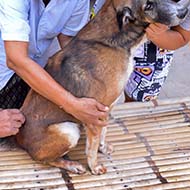
Study will use a smart pet device to identify dog behaviours that may spread the disease.
Vets at the University of Surrey are working to identify dog behaviours that may spread rabies.
The collaborative project announced on World Rabies Day (28 September) will use a smart pet device to monitor movements known to be risky for disease transmission.
One of the oldest diseases known to affect animals and humans, rabies is commonly spread among stray dog populations through biting and scratching.
One of the best ways to tackle the disease is through vaccination - but there is currently very little information about the movement and behaviour of dogs, especially in countries where rabies is endemic.
To tackle this ongoing problem, researchers at the University of Surrey will work with multiple stakeholders and experts, including Surrey University’s Veterinary Health Innovation Engine (vHive), Kinship, a division of Mars Petcare, and Zoetis.
The results will be used to inform a larger research project to identify the most efficient distribution and use of vaccines in dogs to combat the disease, which accounts for an estimated 60,000 deaths every year.
Emma Taylor, a PhD researcher at Surrey’s School of Veterinary Medicine, commented: “Only by working together using a science-led approach to counter misinformation about rabies, can we improve public understanding about the risk, improve dog ownership practices and most importantly, save lives.”



 The Veterinary Medicines Directorate (VMD) is inviting applications from veterinary students to attend a one-week extramural studies (EMS) placement in July 2026.
The Veterinary Medicines Directorate (VMD) is inviting applications from veterinary students to attend a one-week extramural studies (EMS) placement in July 2026.